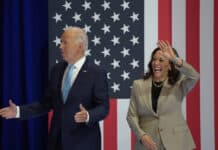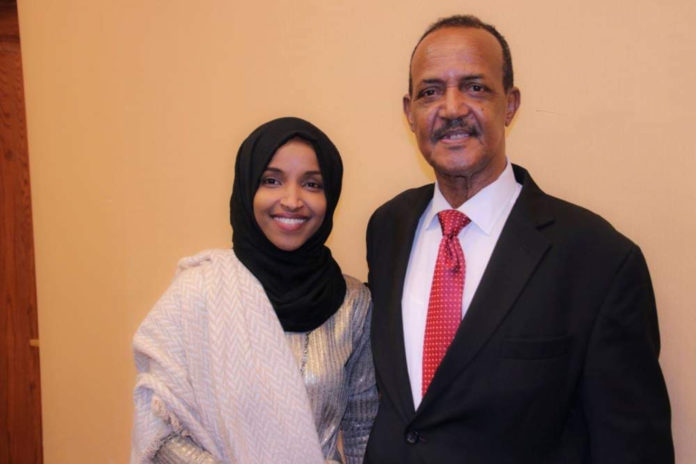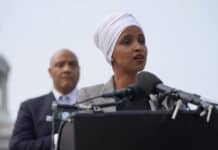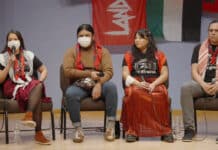- Details about Ilhan Omar’s father’s military service were crystallized after his untimely death last year.
- The congresswoman’s father, Nur Omar Mohamed, served as a colonel in Mohamed Siad Barre’s military. Barre was a genocidal Marxist dictator, ruling Somalia via military force for 22 years.
- It is unknown if Nur Omar Mohamed personally participated in any of the Barre regime’s war crimes or genocidal massacres. However, it is reported he “played a significant role” leading the dictator’s troops.
- Omar’s family fled Somalia as revolutionaries overthrew the Barre regime. She says their escape was possible due to contacts her grandfather had; he was also a high-ranking official in the Marxist dictatorship.
If Rep. Ilhan Omar wants white Americans to apologize for the sins of their ancestors, she should be transparent about her father’s apparent leadership role inside a genocidal Marxist regime.
Omar’s father, Nur Omar Mohamed, passed away last year from COVID-19 complications. Upon his death, Minnesota’s progressive, Omar-friendly Sahan Journal praised “his climb in the military hierarchy, eventually becoming a colonel.” Yusuf Ismail Faraton, another colonel who served alongside Omar Mohamed, told Sahan Journal (which was founded in partnership with and using money from Minnesota Public Radio) that Omar’s father “played a significant role in the war” Somalia waged with Ethiopia from 1977-1978 (the Ogaden War). Other outlets like the Blaze have also reported that Omar’s late father served during the 1982 Somali-Ethiopian Border War.
The first of these wars was defensive, the latter was offensive, and both occurred under the leadership of former Somali president and Marxist military dictator Mohamed Siad Barre, who has been described by the United Nations as having “one of the worst human rights records in Africa.”
Siad Barre
Barre came to power in Somalia in 1969, instituting a program of “scientific socialism” under dictatorial, militaristic one-party rule with the support of the Soviet Union. Omar’s father was part of Barre’s military. He joined after traveling to the USSR to receive a military education in the communist state, Sahan Journal reports.
During his rule, Barre used the military that Omar’s father helped lead to rape, terrorize and pillage his own countrymen. He eventually committed a genocide of the Isaaq people, killing as many as 200,000 civilians in the late 1980s.
However, long before the situation escalated to genocide, Barre’s military was perpetually busy oppressing dissident groups that turned against him after the regime suffered a swift and resounding defeat during the Ogaden War.
“If President Barre had enjoyed even a limited measure of popularity until the mid-1970s, the 1977/78 Ogaden War with Ethiopia would profoundly alter the course of political events in Somalia,” Human Rights Watch (HRW) observed in a 1990 report. “The bitter aftermath of defeat led to criticism of the government’s handling of the war and created new political tensions. In an effort to deflect criticism of his conduct of the war, and nervous about threats to his position, President Barre sought to reassert control by stifling political activity even further. Every challenge was to be met by fierce retaliation.”
Human Rights Watch’s subsidiary Africa Watch compiled testimony of Barre’s brutality between the failed Ogaden War and the Somali-Ethiopia Border War. “The first-hand testimonies Africa Watch has gathered from many witnesses make it clear that the slaughter of defenseless civilians was not an ‘aberration.’ Rather, it was the result of calculation, the outcomes of specific conception of how the war against the insurgents should be fought,” the group concluded.
It is unclear if Omar’s father was in the military during the period from 1978 to 1982 between the two wars he led soldiers in. However, it is extremely unlikely that he would have been unaware of the brutality his own government employed against dissidents during that time. “The government’s response to any hint of resistance” during this period was “indiscriminate use of deadly force, massacres, the looting of private homes and the rape of women by soldiers that accompany arrest and house to house searches,” per HRW.
Despite this brutality, Omar’s father served again in 1982 to bolster Barre’s regime during a new era of even more extreme violence.
1982
In 1982 Omar’s father led a reserve brigade in the Somali-Ethiopian Border War. Also during this time, Barre tapped the military to police civilians with results that were disastrous to human rights.
In “1982, special emergency regulations were put into effect and civilians were placed under the jurisdiction of military tribunals and the military police,” according to HRW. “The extraordinary powers given to the military and security forces under the state of emergency gave them unlimited power over the lives of civilians and led to violent excesses as a matter of policy. As the abuses grew, resistance intensified and the response was increasingly violent.”
HRW reports that “since 1982, the army mined the areas along the main roads, several kilometers from their compounds … hundreds of unsuspecting civilians and animals were killed. No signs were used to warn civilians.” This is the army Omar’s father helped lead.
Barre’s military also kept the country under a strict curfew and harassed and murdered students whom the government perceived as threats.
“The presence of heavily armed soldiers became a feature of school life. At a hint of ‘trouble,’ or simply to cow the students, they stormed on to school premises, fired live ammunition and then arrested the students as they ran for cover,” HRW reports. “Many students were killed in these confrontations and many more were injured.”
“At first they fired warning shots but the use of live ammunition started very early on,” reports one student who was present at a protest against Barre’s military dictatorship. “The soldiers chased us. Many students were arrested. Civilians got killed and wounded. About 300-400 people, overwhelmingly students, were arrested. For a month, there was a curfew,” the student told HRW.
“During this period, killings, arrests and torture increased,” HRW reports. “The quality of teaching deteriorated as teachers became intimidated. School was no longer safe. Whenever soldiers wanted to arrest students and teachers who they thought were anti -government, they came to the school as it was easier to find them there.”
Unsurprisingly, the rule of Somalia by strong-arm military force under the armed forces Omar’s father helped lead “emasculated political development,” and “left a society that is deeply divided.”
Fleeing Somalia
Ilhan Omar released a book last year titled “This is What America Looks Like: My Journey from Refugee to Congresswoman.” In that book, she revealed that while in Somalia her family lived in a guarded compound in the capital city of Mogadishu. She then explained that when she was eight, a civil war broke out in her country. This war was the Somali Civil War during which the Somali Rebellion, a coalition of militias, overthrew Barre and his military.
Omar reports in her book that her compound came under attack by a militia during the war, prompting her family to flee to Kenya. Mainstream news outlets like ABC have also reported that a militia attempted to raid Omar’s father’s compound during the civil war but never cared to ask why the revolutionaries were apparently targeting members of the Barre government.
“Our family was no longer welcome,” the congresswoman told City Pages during an interview about her family’s escape from Somalia. She did not specify why they were no longer welcome.
Her family split into groups to escape the revolution. Her group ended up in Kenya thanks to connections her grandfather (Barre’s National Marine Transport Director) had, she explained to City Pages in 2016.
By the time these militias forced Omar’s family out of their compound, the president her father fought to legitimize had already completed his genocide of 200,000 Isaaq people and solidified his reputation as a human rights abuser famed for spreading torture and depravity.
Questions remain
Eight-year-old Ilhan Omar was an innocent child in a terrifying situation as her family departed their home country. Caught between apparent family allegiance to the old Marxist regime and democratic revolutionaries, her life was in danger — threatened by forces likely beyond her understanding at the time and surely beyond control.
However, because she demands that Americans be accountable to pay for the sins of their distant ancestors, it holds that she should also clarify the involvement of her own nuclear family in a government that used rape, torture and genocide as a matter of policy.
Why did Omar’s family flee Somalia? Were they innocent refugees escaping a dire situation or were they led by two patriarchs (her father and grandfather) eluding justice at the hands of militias who overthrew their brutal government? Were they something else entirely?
Why did details of Omar’s father’s military service remain largely unconfirmed until after his death when a fellow colonel in Barre’s forces commented on his service to Sahan Journal?
Was her father involved in military activity between the 1977 Ogaden War and the 1982 Somali-Ethiopian Border War when the army brutalized civilians who were discontent with the regime’s performance during the first of these conflicts?
Most importantly: when did Omar’s father exit military service? If he departed from the army directly following the border war, it is unlikely he was personally involved in the Isaaq genocide (although his actions would have played some part in reinforcing the Barre regime in the years leading up to this travesty). However, there is no indication that the border war was the last of his service, meaning that it’s entirely possible that he was involved in the calculated destruction of nearly a quarter million civilians under a communist dictatorship.
Bottom line
Siad Barre was a brutal military dictator. Omar’s father was part of his military. If average Americans are required to apologize for the sins of their long dead ancestors (slavery, wars with native people), why shouldn’t we demand that Omar does the same in the case of her father?
A note to the ‘fact-checkers’
Previous ponderings about the life of Omar’s father in communist Somalia have earned the ire of self-described “fact-checkers” like the people at Snopes, who criticized those drawing connections between Nur Omar Mohamed and Barre’s dictatorship in 2019. Since then, however, new facts (chiefly the account Faraton gave to Sahan Journal) have emerged, strengthening this connection.
The mainstream media’s “fact-checkers” have never been able to disprove that Omar’s father served in Barre’s inhumane military. They have only browbeaten those who ask questions about it.


















